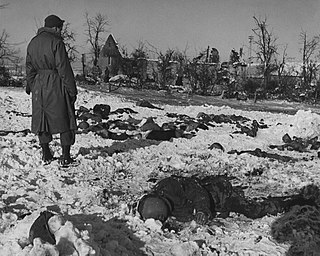Related Research Articles

A war crime is a violation of the laws of war that gives rise to individual criminal responsibility for actions by the combatants, such as intentionally killing civilians or intentionally killing prisoners of war, torture, taking hostages, unnecessarily destroying civilian property, deception by perfidy, wartime sexual violence, pillaging, the conscription of children in the military, committing genocide or ethnic cleansing, the granting of no quarter despite surrender, and flouting the legal distinctions of proportionality and military necessity.

The just war theory is a doctrine, also referred to as a tradition, of military ethics which is studied by military leaders, theologians, ethicists and policy makers. The purpose of the doctrine is to ensure that a war is morally justifiable through a series of criteria, all of which must be met for a war to be considered just. The criteria are split into two groups: "right to go to war" and "right conduct in war" . The first group of criteria concerns the morality of going to war, and the second group of criteria concerns the moral conduct within war. There have been calls for the inclusion of a third category of just war theory dealing with the morality of post-war settlement and reconstruction. The just war theory postulates the belief that war, while it is terrible but less so with the right conduct, is not always the worst option. Important responsibilities, undesirable outcomes, or preventable atrocities may justify war. Opponents of the just war theory may either be inclined to a stricter pacifist standard or they may be inclined toward a more permissive nationalist standard. In many cases, philosophers state that individuals do not need to be plagued by a guilty conscience if they are required to fight. A few philosophers ennoble the virtues of the soldier while they also declare their apprehensions for war itself. A few, such as Rousseau, argue for insurrection against oppressive rule.
The legitimacy under international law of the 1999 NATO bombing of the Federal Republic of Yugoslavia has been seriously questioned. The UN Charter is the foundational legal document of the United Nations (UN) and is the cornerstone of the public international law governing the use of force between States. NATO members are also subject to the North Atlantic Treaty.
A casus belli is an act or an event that either provokes or is used to justify a war. A casus belli involves direct offenses or threats against the nation declaring the war, whereas a casus foederis involves offenses or threats against its ally—usually one bound by a mutual defense pact. Either may be considered an act of war.
The Nuremberg principles are a set of guidelines for determining what constitutes a war crime. The document was created by the International Law Commission of the United Nations to codify the legal principles underlying the Nuremberg Trials of Nazi party members following World War II.
Jus ad bellum is a set of criteria that are to be consulted before engaging in war in order to determine whether entering into war is permissible, that is, whether it is a just war.
A war of aggression, sometimes also war of conquest, is a military conflict waged without the justification of self-defense, usually for territorial gain and subjugation.

The Commissar Order was an order issued by the German High Command (OKW) on 6 June 1941 before Operation Barbarossa. Its official name was Guidelines for the Treatment of Political Commissars. It instructed the Wehrmacht that any Soviet political commissar identified among captured troops be summarily executed as a purported enforcer of the "Judeo-Bolshevism" ideology in military forces. It is one of a series of criminal orders issued by the leadership.
The Charter of the International Military Tribunal – Annex to the Agreement for the prosecution and punishment of the major war criminals of the European Axis was the decree issued by the European Advisory Commission on 8 August 1945 that set down the rules and procedures by which the Nuremberg trials were to be conducted. This then served as a model for the Tokyo Charter issued months later against the Empire of Japan.
International humanitarian law (IHL), also referred to as the laws of armed conflict, is the law that regulates the conduct of war. It is a branch of international law that seeks to limit the effects of armed conflict by protecting persons who are not participating in hostilities and by restricting and regulating the means and methods of warfare available to combatants.

International criminal law (ICL) is a body of public international law designed to prohibit certain categories of conduct commonly viewed as serious atrocities and to make perpetrators of such conduct criminally accountable for their perpetration. The core crimes under international law are genocide, war crimes, crimes against humanity, and the crime of aggression.

Command responsibility, also called superior responsibility, the Yamashita standard, or the Medina standard, is the legal doctrine of hierarchical accountability for war crimes. The legal doctrine of Command Responsibility was codified in the Hague Conventions of 1899 and 1907, and is partly based upon the American Lieber Code, a war manual for the Union forces, authorized by US President Abraham Lincoln in 1863, two years into the course of the American Civil War. The legal doctrine of command responsibility was first applied by the German Supreme Court, in the Leipzig War Crimes Trials (1921), which included the trial of Imperial German Army officer Emil Müller for the war crimes that he committed during the First World War (1914–1918).

A crime of aggression or crime against peace is the planning, initiation, or execution of a large-scale and serious act of aggression using state military force. The definition and scope of the crime is controversial. The Rome Statute contains an exhaustive list of acts of aggression that can give rise to individual criminal responsibility, which include invasion, military occupation, annexation by the use of force, bombardment, and military blockade of ports. Aggression is generally a leadership crime that can only be committed by those with the power to shape a state's policy of aggression, rather than those who carry it out.
Jus post bellum is a concept that deals with the morality of the termination phase of war, including the responsibility to rebuild. The idea has some historical pedigree as a concept in just war theory. In modern times, it has been developed by a number of just war theorists and international lawyers. However, the concept means different things to the contributors in each field. For lawyers, the concept is much less clearly defined, and many have rejected the usefulness of the concept altogether. The concept continues to attract scholarly interest in the field of international humanitarian law.

Superior orders, also known as the Nuremberg defense or just following orders, is a plea in a court of law that a person, whether a member of the military, law enforcement, a firefighting force, or the civilian population, should not be considered guilty of committing actions that were ordered by a superior officer or official.
The International Military Tribunal for the Far East Charter, also known as the Tokyo Charter, was the decree issued by General Douglas MacArthur, Supreme Commander for the Allied Powers in Allied-occupied Japan, on January 19th, 1946 that set down the laws and procedures by which the Tokyo Trials were to be conducted. The charter was issued months following the surrender of Japan on September 2nd, 1945, which brought World War II to an end.

Russian war crimes are the violations of the law of war, including the Hague Conventions of 1899 and 1907 and the Geneva Conventions, consisting out of war crimes and crimes against humanity, of which the official armed and paramilitary forces of the Russian Federation are accused of committing since the dissolution of the Soviet Union in 1991. This also extends to include aiding and abetting crimes of proto-states or client states armed and financed by Russia, including Luhansk People's Republic and Donetsk People's Republic. These have included the summary execution of captured enemy combatants, the mistreatment of prisoners during interrogation (torture), and the use of violence against civilian non-combatants, including rape.
The lex pacificatoria is a Latin neologism, which translates as 'pacific law' or the 'law of the peacemakers'; it refers to the law relating to agreements or treaties ending a state of war or establishing a permanent peace between belligerents, as articulated by state and non-state peacemakers, such as peace negotiators. As such, it is a set of normativizing practices, the ‘industry standards’ of peacemakers. In its relationship with traditional legal doctrines such as the jus ad bellum, it is both incorporated in, and shapes, interpretations of binding legal instruments, and it can also be determinative of, or influence, court judgments. The term was popularized by the legal scholar Christine Bell in her 2008 book On the Law of Peace: Peace Agreements and the Lex Pacificatoria. Bell contrasts the notion with the Law of War, stressing that the art of post-war peace deserves as much consideration as the waging of war, and the notion is related to the jus post bellum, the concept of justice after war, with which it has been critiqued.

The International Legion of Territorial Defense of Ukraine or the Ukrainian Foreign Legion is a military foreign legion military unit of the Territorial Defense Forces of Ukraine, created by the Government of Ukraine at the request of President Volodymyr Zelenskyy to fight in the Russian invasion of Ukraine.
Many international law experts have opined that the 2022 Russian invasion of Ukraine violated international law. The invasion has also been called unlawful under some countries' domestic criminal codes—including those of Ukraine and Russia—although there are procedural obstacles to prosecutions under these laws. This article discusses the international and domestic legal provisions Russia is said to have violated, as well as Russia's legal justifications for the invasion and the responses of legal experts to those justifications. The legality of the Russian invasion per se is a distinct subject from whether individual political officials or combatants have engaged in war crimes or crimes against humanity.
References
- ↑ Osiel, Mark J. (2017). Obeying Orders: Atrocity, Military Discipline and the Law of War. Routledge. p. 3. ISBN 978-1-351-50257-3.
- ↑ Sayapin, Sergey (2018). "An Alleged "Genocide of Russian-Speaking Persons" in Eastern Ukraine: Some Observations on the "Hybrid" Application of International Criminal Law by the Investigative Committee of the Russian Federation". The Use of Force against Ukraine and International Law: Jus Ad Bellum, Jus In Bello, Jus Post Bellum. T.M.C. Asser Press. pp. 313–326. ISBN 978-94-6265-222-4.